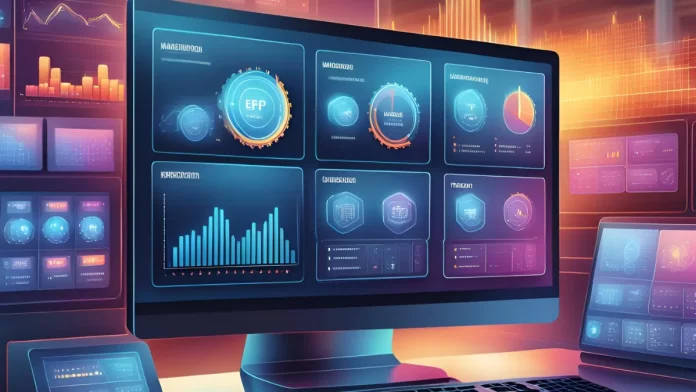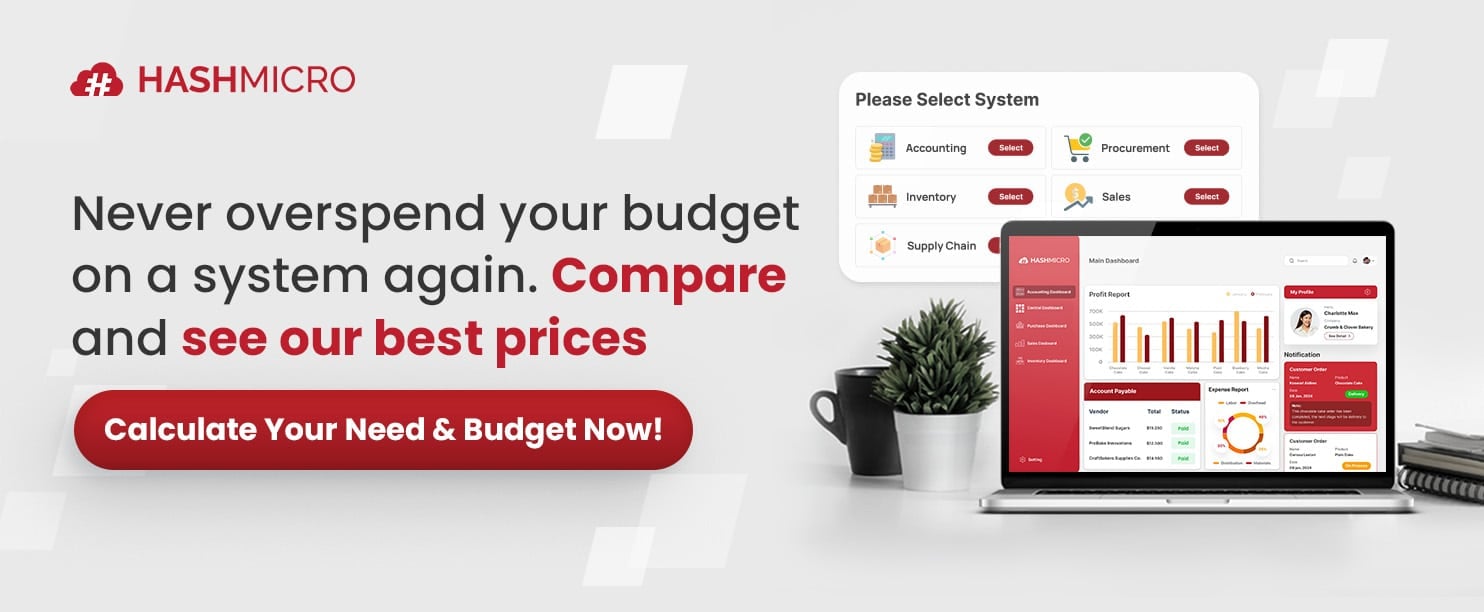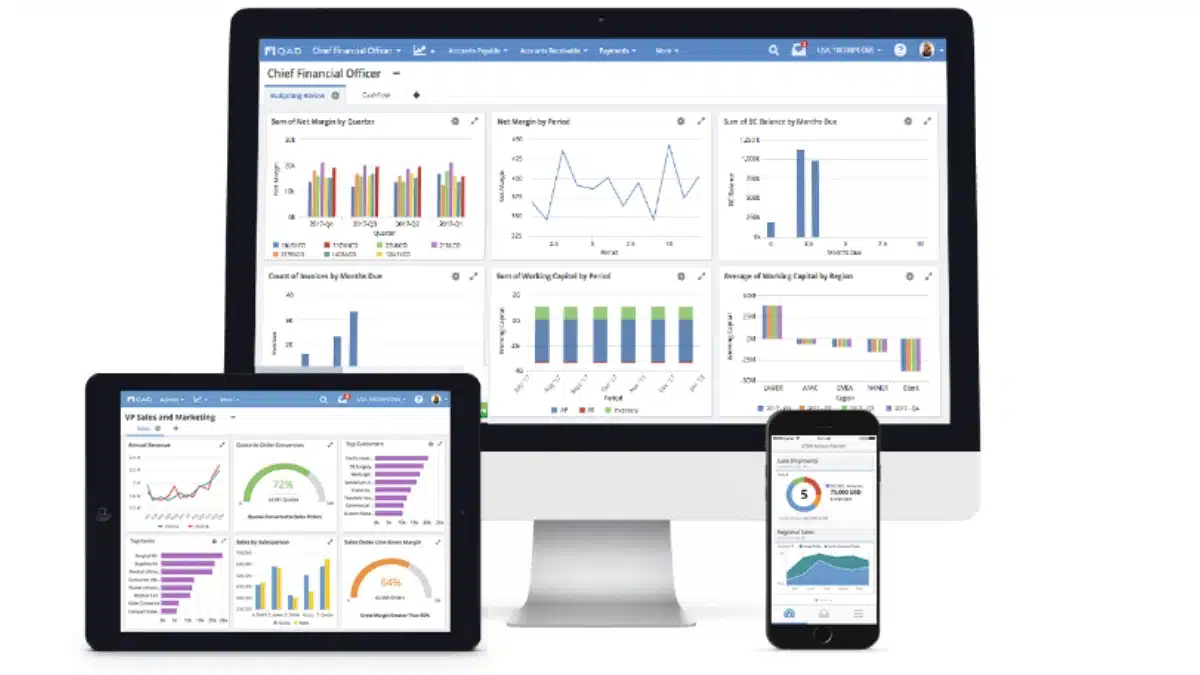Imagine your production line running nonstop, deadlines continuously missed, and your finance department overwhelmed with data inconsistencies. These challenges often point to one root cause, the absence of a reliable Manufacturing ERP system that brings everything together.
Without the right ERP system for manufacturing, managers are left to deal with recurring errors, rising operational costs, and a lack of real-time visibility across departments. Over time, these inefficiencies can seriously affect output, profit margins, and customer satisfaction.
A recent study by Statista shows that ERP adoption across Southeast Asia, including Malaysia, is steadily increasing due to its proven impact on cost reduction and operational efficiency. One notable solution in this space is HashMicro Manufacturing ERP, trusted by leading manufacturers for its automation capabilities, customizable features, and user-friendly interface.
To help you make a well-informed decision, this article explores 13 of Malaysia’s best Manufacturing ERP systems for 2025. Continue reading to discover which software is best suited to elevate your operations and support your business growth.
Table of Content
Content Lists

Key Takeaways
|
What is Manufacturing ERP?
A manufacturing ERP system is a specialized software solution that helps manufacturing businesses in Malaysia manage and optimize their daily operations. It integrates essential functions like production planning, inventory control, quality assurance, and financial accounting into a unified platform, enabling manufacturers to operate more efficiently and accurately.
Unlike general ERP solutions, an ERP system for manufacturing is tailored to address the unique challenges of factory environments, such as managing raw materials, machine capacity, and shop floor workflows. Whether you’re producing bicycles, electronics, or food products, this system ensures that every report and output is directly relevant to your industrial processes.
By adopting production ERP software, manufacturers can gain real-time insights, reduce manual errors, and boost productivity across departments. This manufacturing resource planning system is especially valuable for small to medium enterprises (SMEs) aiming to scale operations while staying competitive.
Some common manufacturing ERP system examples include solutions that support demand forecasting, batch tracking, and automated procurement—all essential features in a modern industrial resource planning system.
Why Use a Manufacturing ERP System in Malaysia?

In Malaysia’s fast-evolving industrial sector, a manufacturing ERP system is vital in helping businesses navigate supply chain complexity and regulatory compliance. By integrating operations across departments—from procurement to production and distribution—this system ensures smoother workflows and greater operational visibility.
A modern ERP system for manufacturing empowers companies to optimize their use of materials, manpower, and machinery, resulting in reduced production delays and improved response to market changes. With access to real-time data and insights, manufacturers can swiftly adapt to customer demands while maintaining high product quality and performance.
A production ERP software also supports scalability by offering flexible modules tailored to industries such as automotive, electronics, or food manufacturing. For example, specialized tools like accounting for manufacturing or shop floor monitoring modules provide automation, reporting, and advanced analytics, making it easier to grow sustainably.
Benefits of Using Manufacturing ERP that Boosts Your Business
Implementing a manufacturing ERP system can transform your business, leading to higher efficiency, better resource management, and long-term growth. Below are key benefits that showcase why more Malaysian manufacturers are turning to ERP to stay ahead of the competition:
- Enhanced production planning and scheduling: A reliable production ERP software helps manufacturers schedule tasks efficiently and allocate resources based on real-time demand. This reduces production delays and ensures smoother factory operations from start to finish.
- Real-time inventory tracking and management: With an integrated ERP system for manufacturing, you can monitor raw materials, work-in-progress, and finished goods instantly. This minimizes stockouts or overstocking, improving cash flow and operational accuracy.
- Streamlined procurement processes: An advanced industrial resource planning system automates the purchasing cycle, from requisitions to supplier coordination. This ensures timely material delivery and better cost control across the supply chain.
- Improved supply chain coordination: By connecting multiple departments, a manufacturing resource planning system promotes seamless collaboration between production, procurement, and logistics. As a result, you can respond faster to market shifts and customer demands.
- Automated quality control: A modern ERP system manufacturing includes quality checks and data logging at every production stage. This helps enforce standards, reduce defects, and build customer trust through consistent product quality.
- Accurate financial management and reporting: Integrated financial tools within a manufacturing ERP system provide real-time insights into budgets, expenses, and profitability. These features support better decision-making and ensure compliance with accounting standards.
- Greater overall efficiency and cost reduction: ERP systems help manufacturers reduce operational costs by automating routine tasks and eliminating redundancies. Whether you’re managing shop floor processes or financials, everything becomes faster, leaner, and more efficient.
Key Features of Manufacturing ERP
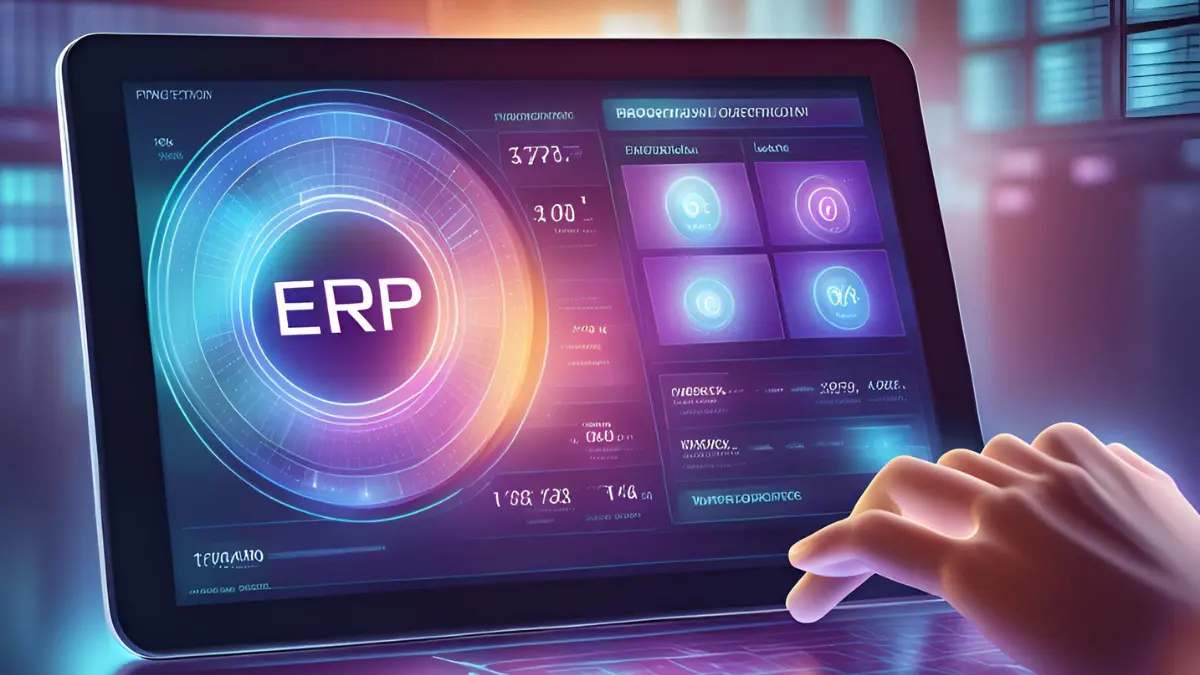
A modern manufacturing ERP system combines critical tools and processes across departments to enhance productivity and operational control. Here are the essential features that make an ERP system for manufacturing a powerful solution for Malaysian businesses:
- More intelligent Material Requirements Planning (MRP): At the heart of any production ERP software, MRP ensures that materials and components are available for production when needed. It helps manufacturers avoid bottlenecks by optimizing real-time inventory levels, scheduling, and procurement.
- Automated quality management: This feature automates inspections and compliance tracking to maintain consistent product standards. A robust manufacturing resource planning system helps reduce errors, prevent rework, and protect your brand reputation in competitive markets.
- Streamlined supply chain management: An integrated industrial resource planning system improves supplier, manufacturer, and distributor coordination. It streamlines logistics, lowers operational costs, and enhances delivery speed to meet customer expectations.
- Integrated Customer Relationship Management (CRM): Built-in CRM modules help efficiently manage sales pipelines, customer interactions, and after-sales service. This boosts customer satisfaction, improves retention, and strengthens long-term business relationships.
- Financial Management: A reliable ERP system manufacturing provides real-time financial visibility with accurate reporting, budgeting, and forecasting tools. This ensures businesses comply with local accounting standards while making informed strategic decisions.
- Inventory and Warehouse Management: This module tracks raw materials, finished goods, and storage locations with real-time data. It reduces wastage, improves order accuracy, and ensures better space utilization within the warehouse.
- Production monitoring and scheduling: A key advantage of manufacturing ERP system examples is the ability to plan, assign, and track production tasks with precision. This enables better resource use and minimizes downtime across the shop floor.
Top 12 Manufacturing ERP for Businesses in 2025
With numerous ERP options for the manufacturing industry in 2025, we’ve curated the 12 best ERPs for manufacturing businesses that may be ideal for your business. Each vendor offers its pros and cons, so it’s essential to evaluate them carefully and select the ERP that provides the most significant benefits for your company.
1. HashMicro Manufacturing ERP
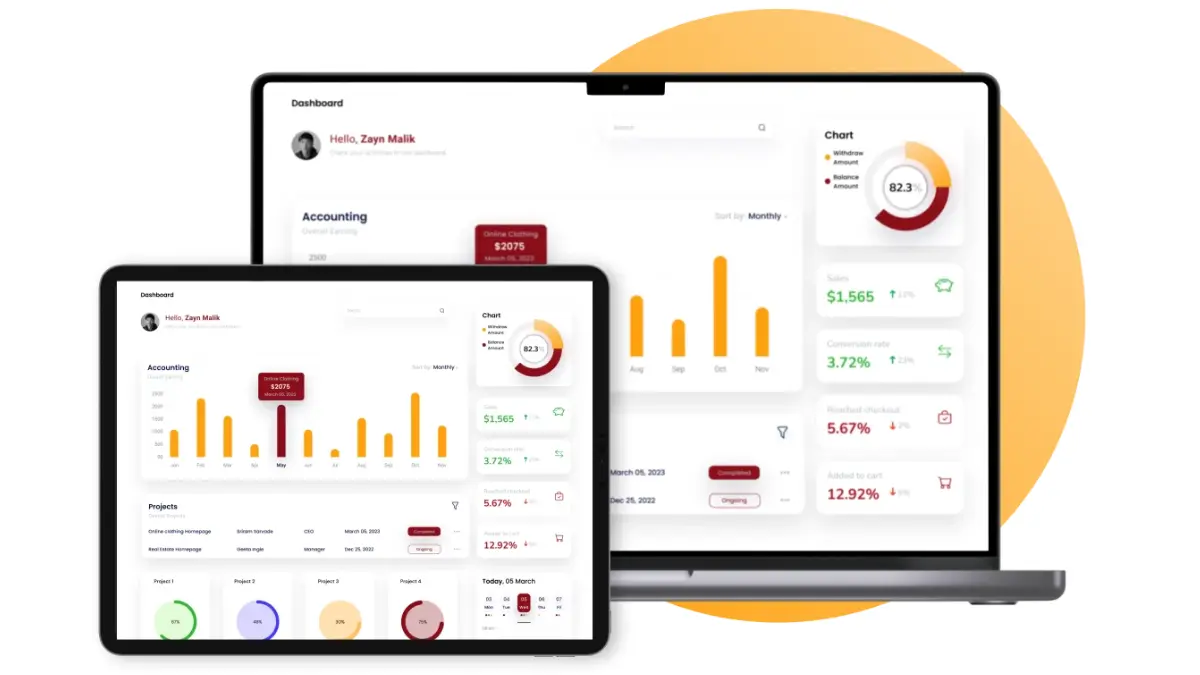
HashMicro is one of the leading ERP providers in Malaysia. It offers a powerful Manufacturing ERP system that helps automate and simplify complex production processes. Trusted by over 1,750 businesses across Southeast Asia, HashMicro offers intelligent, end-to-end manufacturing solutions tailored for precision, efficiency, and local compliance.
For Malaysian manufacturers looking to streamline operations, you can easily register for a free demo with HashMicro. This demo allows you to explore how the system optimises production planning, automates procurement and inventory, and integrates seamlessly with other business tools.
Why is HashMicro among our top recommendations? We’ve chosen HashMicro for its intuitive user interface, scalable system architecture, and responsive local support. With customisable modules and a strong focus on automation, this ERP solution empowers manufacturers in Malaysia to reduce manual errors, improve decision-making, and achieve sustainable growth.
Some of its key features are:
- Kiosk Mode: The front-end display enables workers to check production machine readiness and log attendance, streamlining the start of the production process. This results in improved time management and smoother transitions between shifts.
- Manufacturing Production Scheduling: Companies can plan production schedules more accurately by using demand forecasts based on historical data. This optimizes resource allocation, reduces downtime, and aligns production output with actual demand.
- Secret Recipe / BoM: Controlling access to sensitive BoM data and secret product formulas ensures that only authorized personnel can create or modify them. This protects intellectual property and maintains the integrity of product designs and processes.
- Manufacturing Requisition Planning: This feature helps companies plan their production needs in detail, ensuring that raw materials and resources are on time. It prevents production delays and ensures that the production process runs smoothly without interruptions.
- Conveyor Belt Sensor IoT Integration: IoT sensors monitor production lines for issues such as bottlenecks or damaged goods, sending alerts and analytical data in real time. This helps optimize production flow and allows quick corrective actions to be taken, improving overall efficiency.
- Manufacturing Quality Control: The system identifies nonconforming items and organizes corrective actions to address quality issues. Consistent quality leads to fewer defective products, reduced waste, and higher customer satisfaction.
- Finished Goods Production Simulation: By simulating finished goods production, the ERP system ensures that material stock levels are sufficient to meet production goals. This prevents shortages and ensures that production runs without interruption, maintaining efficiency.
- Real-Time Stock Input and Output: The system tracks stock input and output in real time, providing up-to-date information on inventory levels. This improves stock management, reduces overstocking, and ensures materials are available when needed for production.
- In-depth Reporting and Analytics: The system provides detailed reports on production performance, time spent, materials used, and finished goods produced. This data empowers managers to make informed decisions, optimize processes, and improve production efficiency.
| Pros | Cons |
|
|
2. Oracle NetSuite
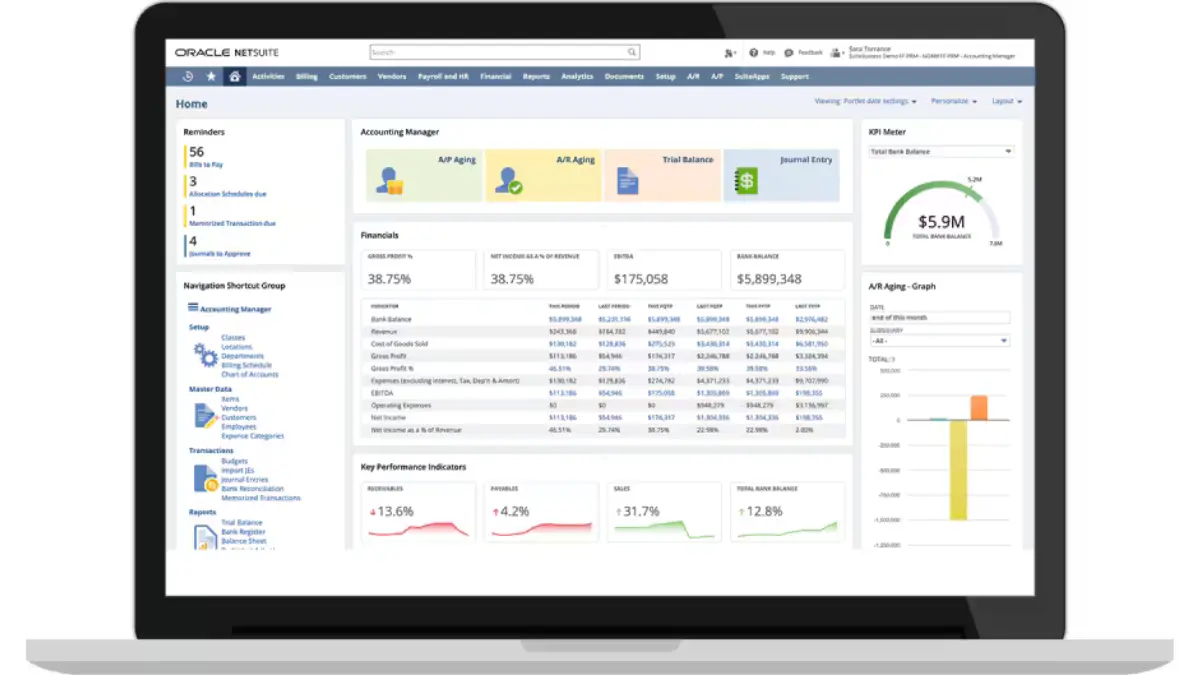
Oracle NetSuite is a cloud-based ERP solution designed to help manufacturers manage financials, inventory, and operations through a unified, real-time platform. Backed by Oracle’s global infrastructure, it is especially ideal for Malaysian businesses with complex supply chains, multi-site operations, and a need for scalable, enterprise-grade performance.
Key features:
- Advanced material requirements planning (MRP)
- Shop floor and ERP production control
- Real-time financial reporting and consolidation
- Global supply chain management
- Supply chain management and procurement tools
| Pros | Cons |
|
|
3. SAP S/4HANA
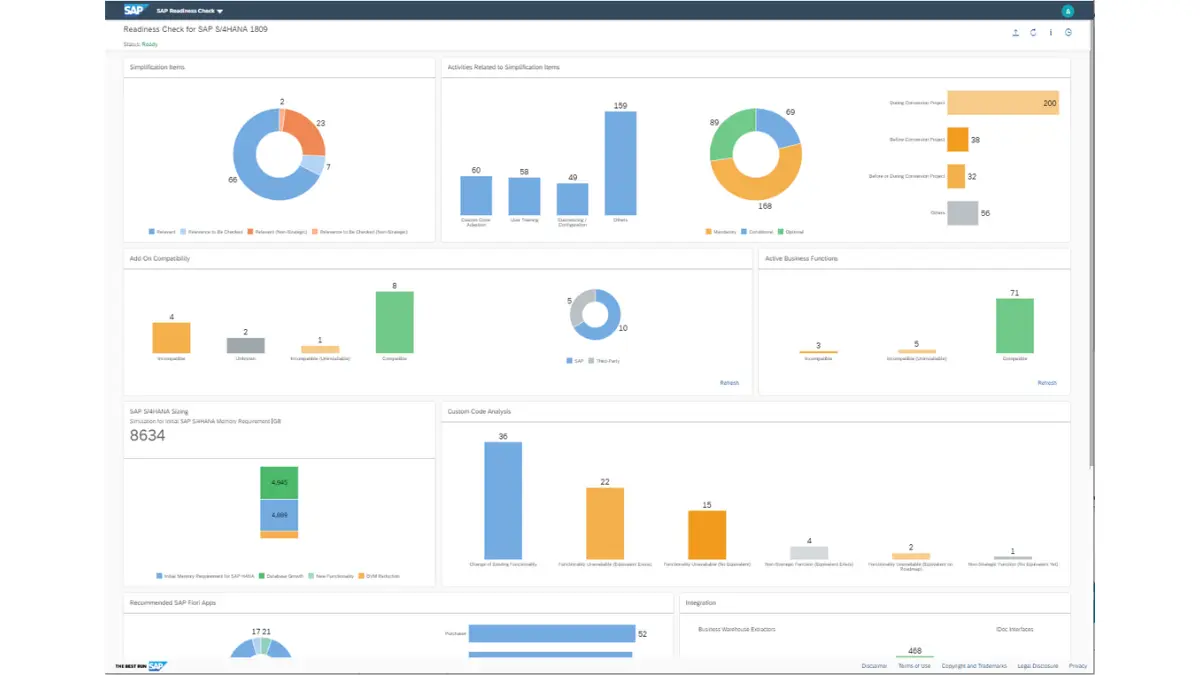
SAP S/4HANA is a powerful ERP platform designed for large-scale manufacturers seeking deep process control, real-time analytics, and global compliance. Built on the HANA in-memory database, it integrates advanced technologies like IoT and machine learning to streamline manufacturing and supply chain operations, making it ideal for Industry 4.0 transformation.
Key features:
- Integrated AI and machine learning for predictive analytics
- Advanced supply chain management
- End-to-end production and inventory control
- Advanced financial planning and consolidation
| Pros | Cons |
|
|
4. Microsoft Dynamics 365 Business Central
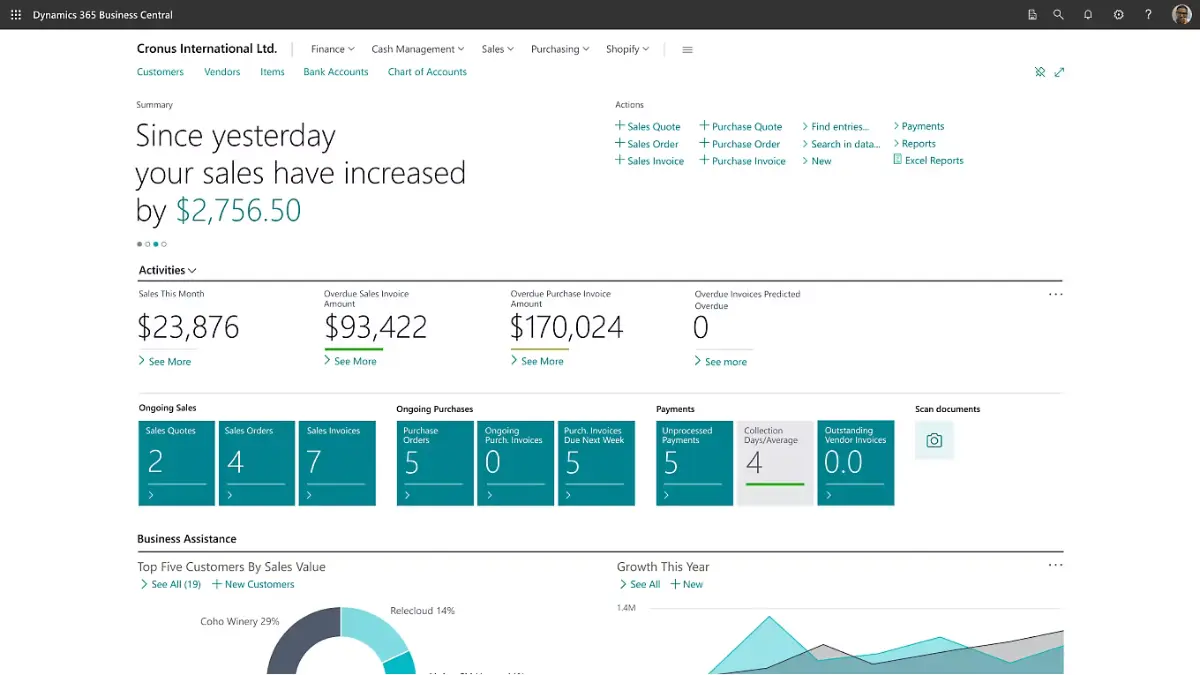
Microsoft Dynamics 365 Business Central is a comprehensive ERP solution that enables manufacturers to efficiently manage finance, operations, and supply chains while integrating seamlessly with familiar Microsoft tools like Excel, Power BI, and Teams.
Its user-friendly interface and real-time insights empower businesses to enhance collaboration and streamline processes without adding complexity.
Key features:
- Integrated financial and production planning
- Sales and service management
- Supply chain optimization
- AI-powered insights and automation
- Inventory, warehouse, and production planning
| Pros | Cons |
|
|
5. Epicor Kinetic
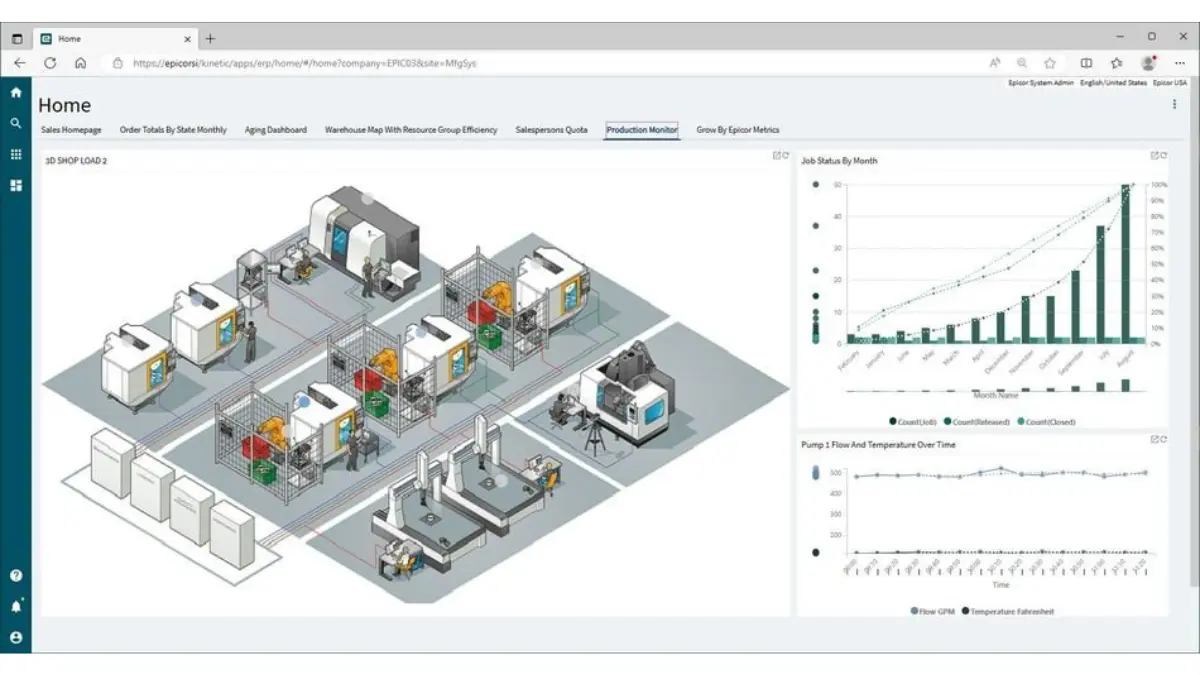
Epicor Kinetic is a cloud-based ERP solution purpose-built for manufacturers, offering robust support for both discrete and process industries. With deep industry functionality and support for custom production models like ETO and MTO, it’s ideal for Malaysian businesses with complex workflows and high customization needs.
Key features:
- Advanced production management and scheduling
- Embedded IoT (Internet of Things) for real-time shop floor data
- Quality and compliance management
- Global supply chain and inventory management
| Pros | Cons |
|
|
6. QT9 ERP for Manufacturing Industry
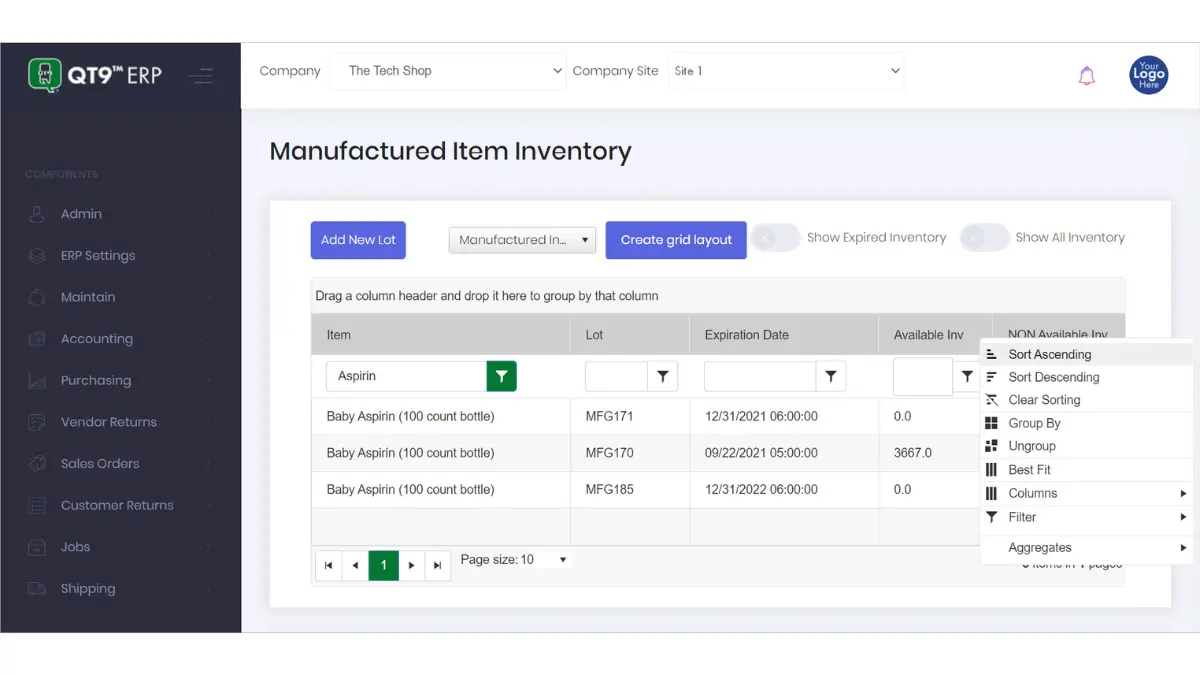
QT9 ERP is a cloud-based, modular solution that enables manufacturers—especially in highly regulated industries—to streamline production while maintaining strict compliance and quality standards. Known for features like built-in document control, CAPA tracking, and audit-ready tools, it offers real-time visibility and automation to enhance traceability and operational efficiency.
Key features:
- Quality management system (QMS)
- Automated document control
- Production scheduling and inventory control
- Supplier and vendor management
| Pros | Cons |
|
|
7. Infor ERP System for Manufacturing
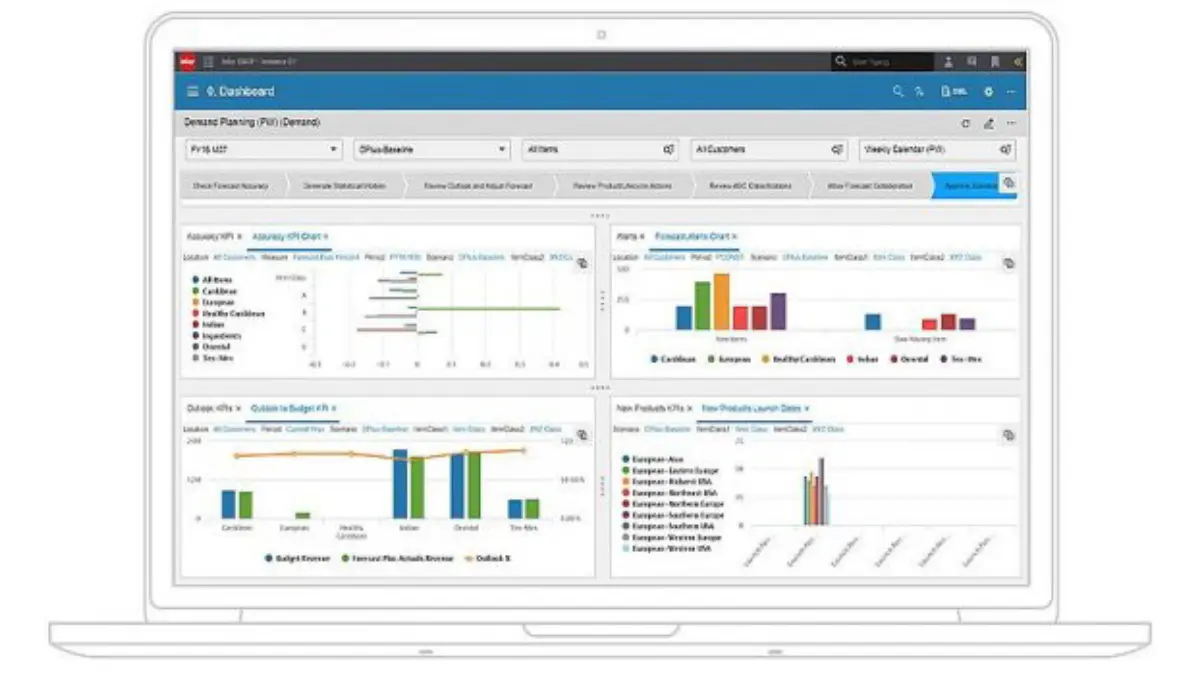
Infor CloudSuite is a cloud-based ERP system built specifically for manufacturers with complex, multi-site operations, offering tailored solutions for both discrete and process manufacturing. Strong support for Industry 4.0 technologies—including IoT, AI-driven insights, and advanced shop floor management—provides a scalable, intelligent platform that enhances visibility, automation, and operational efficiency.
Key features:
- Built-in analytics and reporting
- Advanced material planning and scheduling
- Real-time production monitoring
- Supply chain planning and execution
- Embedded AI and machine learning
| Pros | Cons |
|
|
8. Acumatica
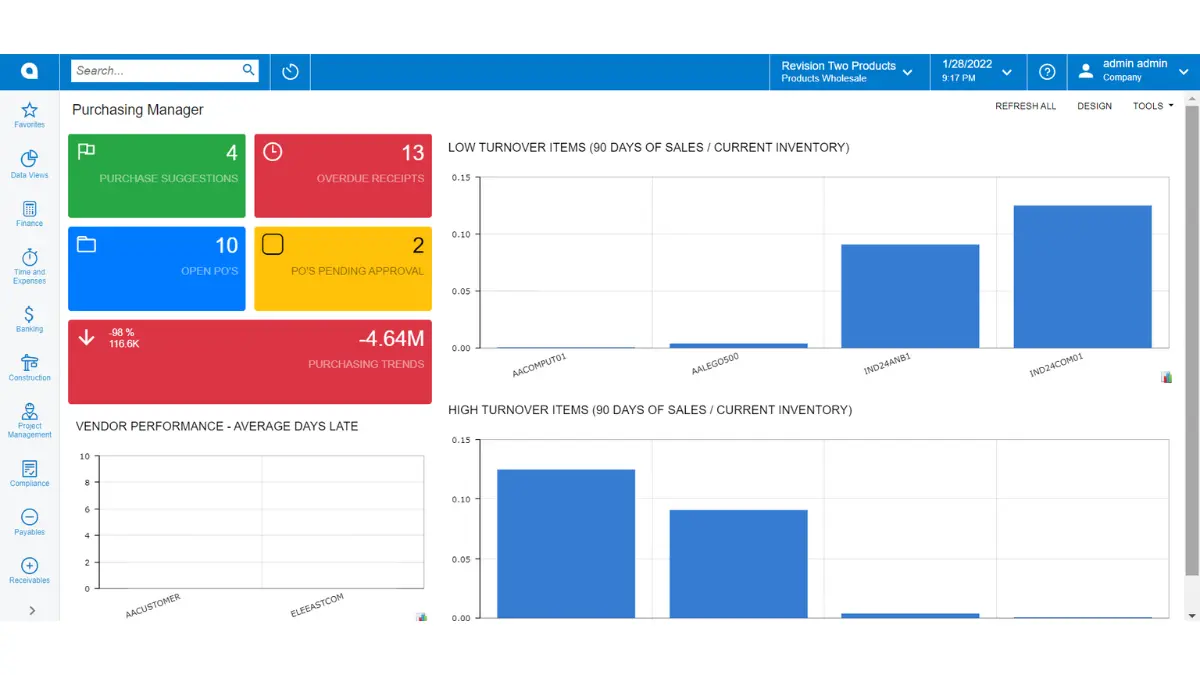
Acumatica is a modern cloud-based ERP system designed for small to mid-sized manufacturers, offering flexible deployment and support for various production models such as make-to-stock, make-to-order, and engineer-to-order.
With a responsive interface and real-time data integration across production, inventory, and finance, it’s ideal for manufacturers seeking high customizability and operational control.
Key features:
- Production scheduling and control
- Inventory and warehouse management
- Sales and purchase order management
- Cloud and mobile access
- CRM and financial modules built-in
| Pros | Cons |
|
|
9. Syspro
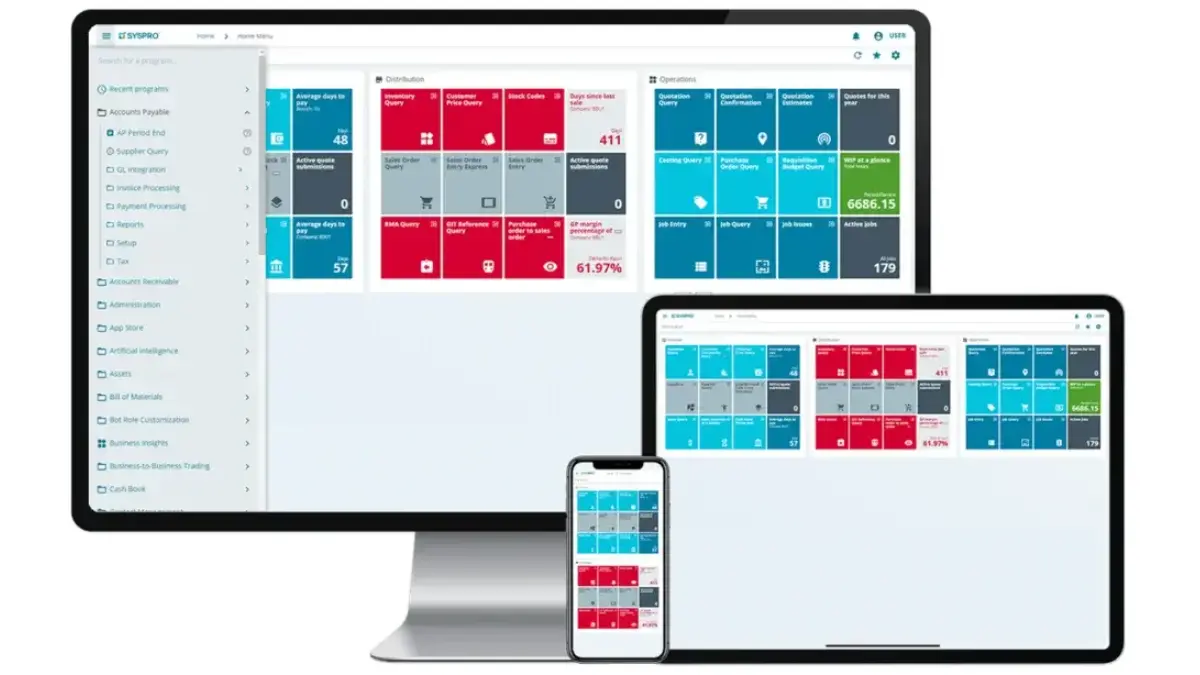
Syspro is a dedicated ERP solution for manufacturing and distribution businesses, offering robust features for production planning, inventory control, and supply chain management. Known for its high configurability and flexible deployment options (cloud or on-premise), Syspro is ideal for mid to large-sized manufacturers aiming to enhance traceability, usability, and end-to-end operational visibility.
Key features:
- Production scheduling and shop floor control
- Inventory and warehouse management
- Supplier and procurement management
- Real-time analytics and reporting
| Pros | Cons |
|
|
10. QuickBooks
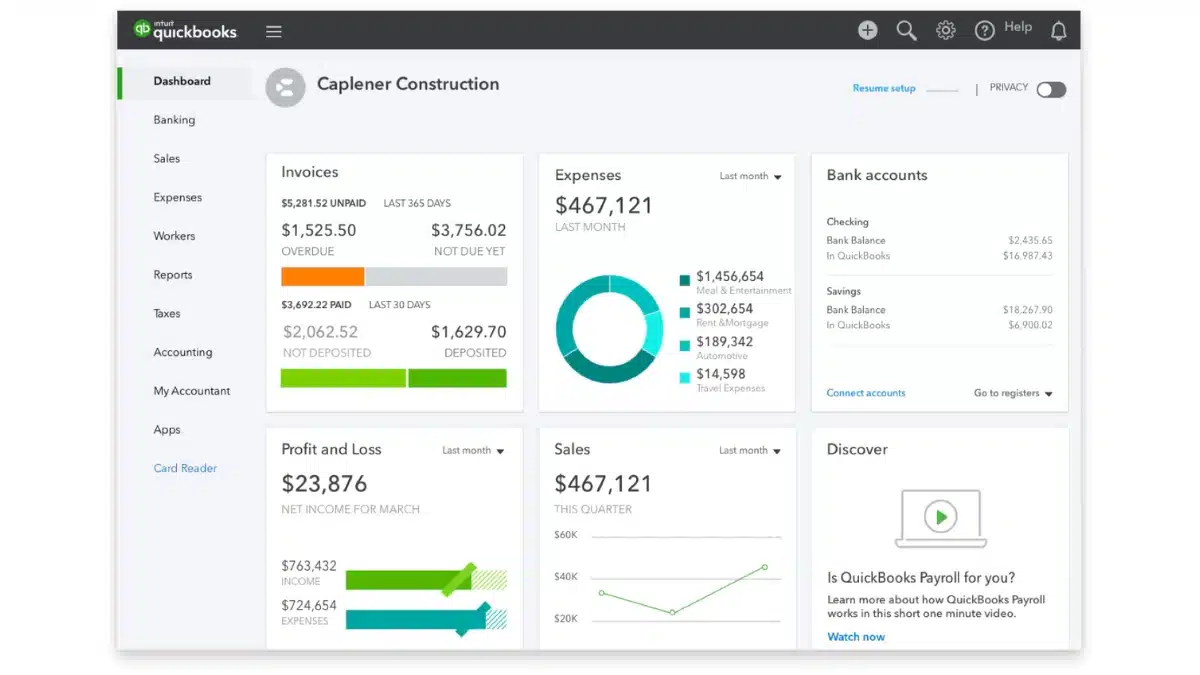
QuickBooks ERP for manufacturing combines its robust accounting capabilities with specialized features to help small and mid-sized manufacturers streamline production, inventory, and financial management in a single platform. Ideal for companies with simpler needs, it offers easy deployment and efficient tools for cost tracking, financial reporting, and order management, making it a great starting point for businesses on their ERP journey.
Key features:
- Production and inventory tracking
- Financial management and reporting
- Order and billing management
- Integrated payroll features
- Vendor and customer tracking
| Pros | Cons |
|
|
11. Plex Manufacturing Cloud ERP
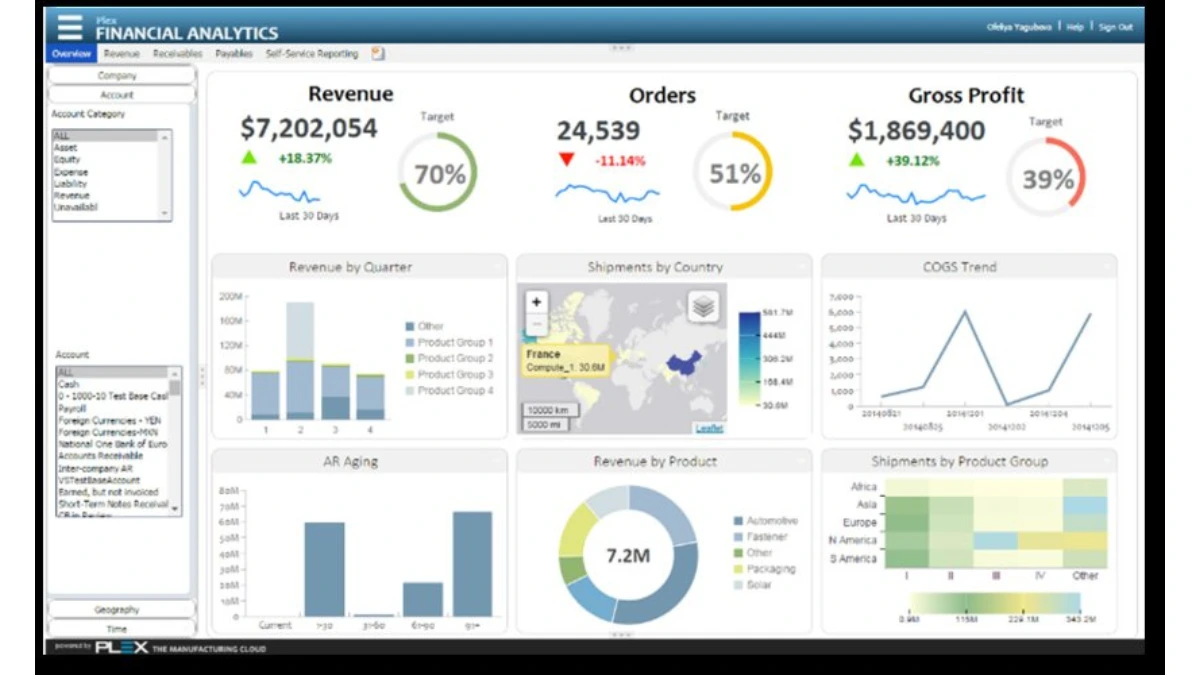
Plex ERP is a cloud-native platform explicitly designed for manufacturers, offering end-to-end solutions that integrate shop floor control with enterprise-level functionality. It provides real-time visibility into plant operations, with strong quality management, traceability, and regulatory compliance tools, making it ideal for automotive, food and beverage, and aerospace industries.
Key features:
- Shop floor and production automation
- Real-time quality management
- Supply chain planning and control
- Cloud-based remote access
- Built-in analytics and reporting tools
| Pros | Cons |
|
|
12. Global Shop Solutions
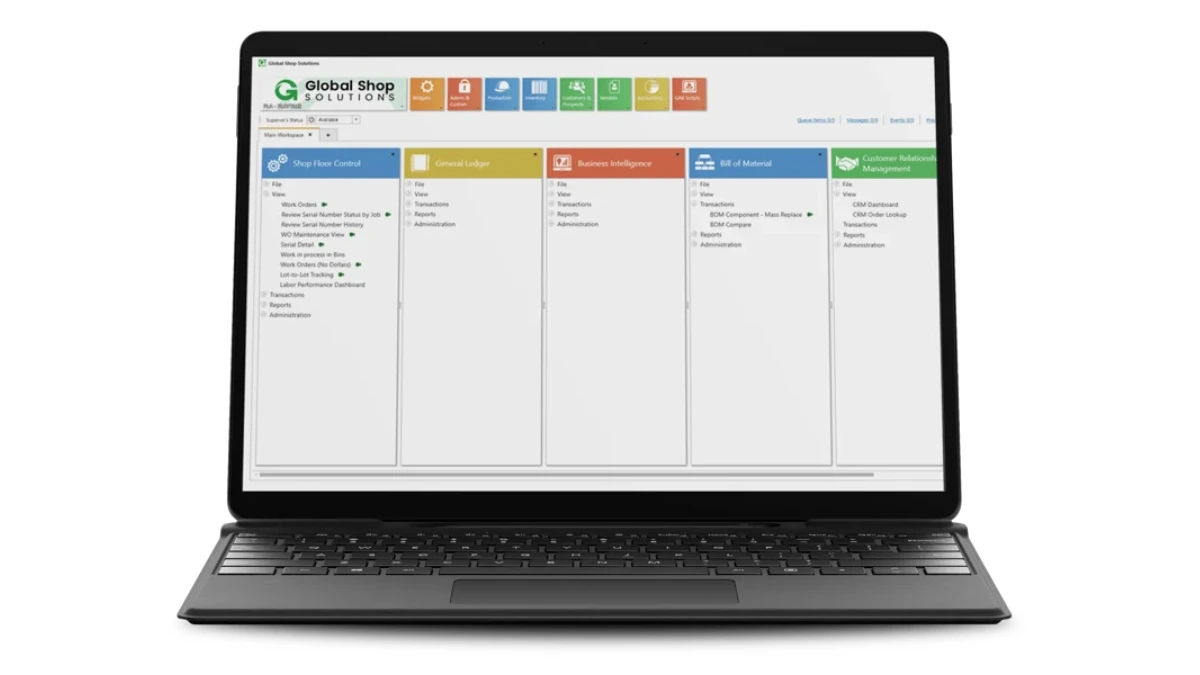
Global Shop Solutions is an all-in-one ERP platform designed to streamline manufacturing operations, offering strong inventory control and real-time production visibility. It supports make-to-stock, make-to-order, and engineer-to-order workflows with customizable features, making it ideal for discrete manufacturers seeking to centralize data and enhance operational efficiency.
Key features:
- Real-time inventory and production management
- Integrated shop floor control
- Customizable dashboards and reporting
- Production and scheduling automation
- CRM and supply chain integration
| Pros | Cons |
|
|
13. QAD Manufacturing ERP
QAD Adaptive ERP is a cloud-based solution designed for global manufacturers in automotive, life sciences, and industrial equipment. It offers real-time insights and industry-specific capabilities.
With its flexible, multi-site, and multi-country support, QAD enables businesses to quickly adapt to market changes, supply chain fluctuations, and regulatory requirements while prioritizing operational excellence and compliance.
Key features:
- Manufacturing management
- Supply chain management
- Financial management
- Customer management
- Analytics and KPI dashboards
| Pros | Cons |
|
|
How to Set Up a Manufacturing ERP in Malaysia
Setting up a manufacturing ERP system requires a structured approach to ensure successful implementation and long-term operational gains throughout the ERP lifecycle. Whether you’re new to ERP or upgrading your system, here are the key steps to guide your ERP journey in Malaysia:
- Evaluation: Evaluate your current business processes and pinpoint pain points, such as inefficient inventory management, slow production cycles, or weak financial tracking. This phase helps you determine the specific goals your ERP system needs to achieve for manufacturing.
- Planning: Develop a detailed project plan outlining objectives, a timeline, a budget, and stakeholder responsibilities. A well-structured plan ensures that every aspect of the industrial resource planning system aligns with your operational goals.
- Prototyping: Create a prototype or sandbox version of the production ERP software to simulate real-time functions in a risk-free environment. This allows your team to explore features, test scenarios, and provide feedback early on.
- Configuration: Customize the manufacturing ERP system based on your business needs, including workflow automation, reporting structures, and user access levels. Proper configuration ensures the system works how your operations run—not vice versa.
- Development: If additional modules or third-party integrations are required, the stage is developing and fine-tuning those solutions. This is especially useful for businesses seeking tailored tools, such as specific accounting features or advanced analytics in some examples of manufacturing ERP systems.
- Testing: Thoroughly test the ERP in a non-production environment to ensure full compatibility, accurate data flow, and user adoption readiness. This phase helps catch system bugs or usability gaps before going live.
- Deployment: Once testing is complete, finalize all configurations and prepare for deployment. Train users, set up support channels, and transition your manufacturing resource planning system into a live environment to integrate it fully with daily operations.
How to Choose the Best Manufacturing ERP in Malaysia
Choosing the right manufacturing ERP system is a crucial decision that can directly impact your operational efficiency and overall profitability. Here’s a step-by-step guide to help Malaysian businesses select the most suitable solution:
- Identify your business needs: Evaluate your current operations and pinpoint challenges like production scheduling, inventory tracking, or reporting. Knowing your priorities helps you find an ERP system for manufacturing that directly addresses those gaps.
- Assess scalability: Ensure the system can grow alongside your business, supporting additional users, locations, and increased production capacity. A scalable manufacturing resource planning system avoids future limitations as your company expands.
- Prioritize customization and flexibility: Look for a production ERP software that allows easy customization to suit your unique processes and workflows. The best solutions provide this flexibility without requiring excessive coding or costly development.
- Check integration capabilities: A good ERP system manufacturing should integrate smoothly with your existing software, such as accounting platforms, CRM systems, or e-commerce tools. Seamless integration reduces disruptions and increases overall efficiency.
- Evaluate user-friendliness: Choose a manufacturing ERP system with an intuitive interface, which will make it easy for your team to adopt with minimal training. Many vendors provide free trials, which you can use to test usability and see if it fits your day-to-day operations.
Conclusion
Selecting the right Manufacturing ERP system is essential for enhancing efficiency, streamlining workflows, and fostering business growth. By carefully assessing your business needs, you can choose an ERP solution that perfectly aligns with your manufacturing operations and drives long-term success.
If you’re seeking comprehensive Manufacturing ERP software that integrates every aspect of your business, HashMicro’s Manufacturing ERP System is an excellent choice. With powerful features, scalability, and strong local support, HashMicro helps optimize your processes from production to finance.
Don’t wait—take the first step toward transforming your operations today by signing up for a free demo of HashMicro’s manufacturing ERP. See firsthand how it can elevate your business and unlock new productivity levels.





